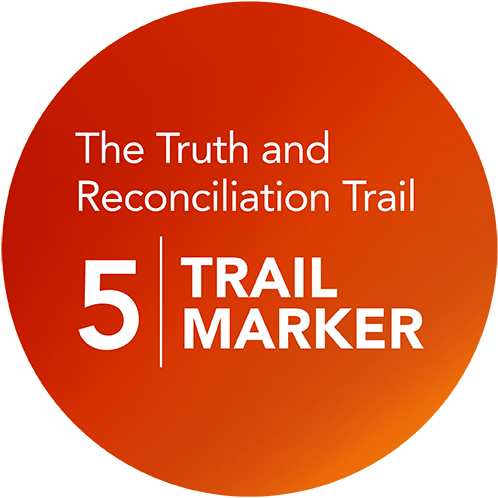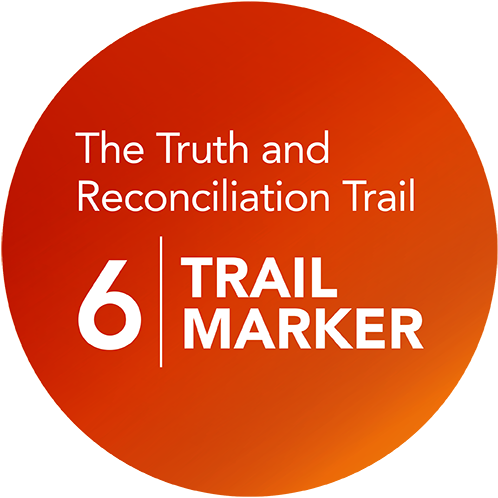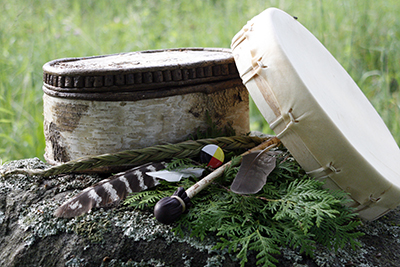Residential School history and legacy
Truth and Reconciliation Trail | Marker 5
You’re now arriving to a difficult Truth along your journey as it involves children and a time when the guise of education was used as a weapon of colonization.
Residential School history
Indian Residential Schools were government-funded, church-run institutions that implemented genocide against Indigenous Nations by targeting their children. The main purpose of these institutions was “to kill the Indian in the child” as children were removed from their families and indoctrinated into Euro-Christian culture. Many children experienced neglect, many experienced abuse, and many never returned home. For generations of Indigenous People, this resulted in a severing of ties to their communities, languages, cultures, and traditions, and a legacy of trauma that persists today.
For almost 150 years, over 150,000 Indigenous children attended the Indian Residential School system. Between the years 1831 and 1996, there were over 130 residential schools across Canada. These institutions were government-funded and most were run by the Roman Catholic, Anglican, United, Methodist, and Presbyterian churches.
The purpose of these schools was to violently assimilate Indigenous children to European-Christian culture. This is evident in the following quotes by various government officials of Canada:
“When the school is on the reserve the child lives with its parents, who are savages; he is surrounded by savages, and though he may learn to read and write his habits, and training and mode of thought are Indian. He is simply a savage who can read and write. It has been strongly pressed on myself, as the head of the Department, that Indian children should be withdrawn as much as possible from the parental influence, and the only way to do that would be to put them in central training industrial schools where they will acquire the habits and modes of thought of white men” (John A. MacDonald, 1883)
“our object is to continue until there is not a single Indian in Canada that has not been absorbed into the body politic.” (Duncan Campbell Scott, 1920)
“Their education must consist not merely of training of the mind, but of a weaning from the habits and feelings of their ancestors, and the acquirements of the language, art and customs of civilized life.” (Egerton Ryerson, 1847 Report for Indian Affairs)
“Indian culture is a contradiction in terms. They are uncivilized. The aim of education is to destroy the Indian.” (Nicholas Flood Davin Report, 1879)

The children’s experiences
The children who attended residential school endured forcible systematic cultural genocide. While not every Indigenous person’s experience at residential school was the same, the following is a list of some of the experiences reported by Residential School Survivors:
- physical, spiritual, emotional, and sexual abuse
- loneliness
- highly regimented daily life -chores to keep the schools self-sustaining
- absence of love, ceremony, culture
- absence of parental role
- forbidden to speak Indigenous languages – required to speak English or French
- required to adopt religious denomination of the school
- forced haircuts or shaved head
- lack of nutritious diet, insufficient quantities of food, spoiled food served
- segregation based on gender- brothers and sisters had no contact
- forced abortions – pregnancy was often a result of rape or learned abusive behaviours
- withholding of medical attention
- exposure to contagious illness- ex, students with tuberculosis not properly segregated
- vilification of cultural traditions and beliefs
- use of racist language to address students
- withholding presents, letters, and contact from family
- corporal punishment and torture such as use of the electric chair, forced sterilization, exposure to freezing temperatures whipping, etc.
- students were used as research subjects for nutritional and health studies
Intergenerational trauma/healing
Due to a severing of ties to their communities, languages, cultures, and traditions over generations, Indigenous People are currently healing from a legacy of trauma persistent in their lives today. September 30th has been designated National Day for Truth and Reconciliation in Canada. It is a day to reflect upon and commemorate the legacy of residential schools and to become more aware of our collective responsibilities to reconciliation with Indigenous People and nations.
Gathering truth
- Stolen Children: Residential School Survivors Speak Out
- Where Are the Children?
- Wawate: Stories of Residential School Survivors
- Stolen Lives: The Indigenous Peoples of Canada and the Indian Residential Schools
- Residential School Education Guide
- Residential School Podcast Series
- Residential School Timeline
- Timeline Exhibit through the National Centre for Truth and Reconciliation
- Map of Residential Schools
- CBC Interactive Map – Did you live near a residential school?
Reconcili-ACTION
Seek out an Indigenous-created commemoration piece that honours the survivors and/or victims of the Indian Residential School system. It can be a commemorative piece in any format – an art piece, a song, a poem, a story, a statue, an installation, a film, event, ceremony, or any other form of commemoration.
As you encounter the commemoration piece, reflect on the impact it has on you. Consider what you it has taught you about the past and what would be required of you for a better future… one where Indigenous children, families, and communities thrive.
How will you share what the commemoration piece taught you with others?
Continue your journey through the trail markers
Trail marker 6 | The Truth and Reconciliation Commission of Canada
Despite the Canadian government’s attempt at assimilation; Indigenous People are still here. In fact, Residential School Survivors brought the topic of residential schools to the public’s agenda. Alongside the largest class action lawsuit against the Canadian government at the time, the Truth and Reconciliation Commission of Canada (TRC) was formed. The TRC’s mandate was to promote awareness to Canadians about the Indian Residential School system and provide an opportunity for those affected by residential schools to courageously share their stories. By honouring their Truths, we can begin to Reconcile for a better future.

